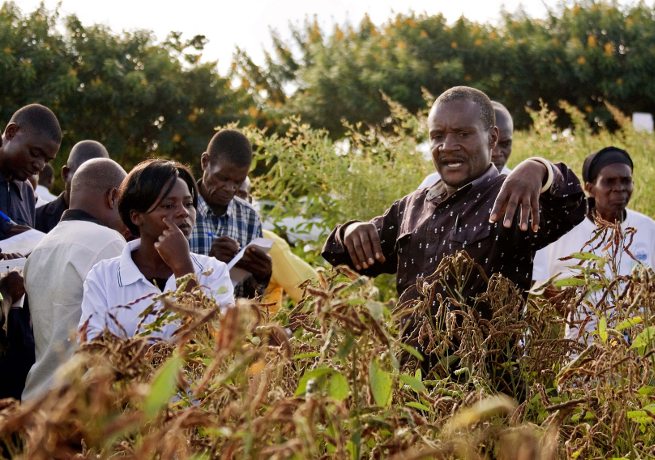Global researchers are using social science, big data and biofortification to attain better yields and better health for people around the world.
Africa
Why is it that in Malawi, the three improved varieties of pigeon pea — which were developed with supposed market-desired traits — received zero levels of adoption, while at the same time, the local Nthawajuni variety spread throughout the country, dominating 80 per cent of the planted area? Social science has the answer.
In Malawi, pigeon pea production, harvest, preparation and sale are all activities that are important to, and carried out by women. While these varieties may have been selected with market-desired traits, breeders did not fully appreciate the gendered preferences of their end-users, nor fully understand how they drive adoption and use.
Today, a renewed focus on gender, fuelled by donors, has increased the research community’s awareness and appreciation of the diversity of end-users. Many plant and animal breeders have not just come to recognize the importance of end-users’ preferences, but also the diversity of those preferences, which arise from their socioeconomic and cultural contexts.
This shared understanding of the importance of considering end-user preferences was a major topic of discussion at a gender, breeding and genomics workshop led by the Consultative Group on International Agricultural Research (CGIAR) Gender and Agriculture Research Network recently held in Nairobi. While there has been a long history of scientists realizing the importance of end-user preferences, for CGIAR, this presented an opportunity to revisit its approaches and facilitate a dialogue between motivated scientists.
So then, what do breeders want from gender research and why are donors willing to fund it? The answer is clear: adoption and impact. The details of interdisciplinary project implementation, however, are more complicated.
Scientists from different disciplines, from the natural to social sciences, clearly recognized the need for, and value of, interdisciplinary work, teams, and the vital role of social science in scaling up the impact of breeding programs.
However, as is most often the case in interdisciplinary work, it is easier said than done. Actual execution depends on close collaboration between breeders and social scientists from the outset. It also requires a deeper, collective understanding of each of these disciplines, a condition that often faces institutional and even epistemological barriers.
Visit cgiar.org for updates on the work being conducted by its Gender and Agriculture Research Network.
India
The CGIAR Platform for Big Data in Agriculture was launched during the ninth annual ICT4D Conference in Hyderabad, India, on May 15. This new multi-center initiative aims to transform food and nutritional security across the developing world through the use of big data, making it more productive, efficient, and resilient to challenges such as population increases and climate change.
The six-year platform will provide global leadership in organizing open data, convening partners to develop innovative ideas, and demonstrating the power of big data analytics through inspiring science projects.
The platform is led by the International Center for Tropical Agriculture and the International Food Policy Research Institute. The International Center for Agricultural Research in the Dry Areas (ICARDA), as one of the partnering centers, will contribute to implementation of modules developed within the context of the platform and assist in the organization and convening of initiatives to support big data and its use.
Mexico
In an effort to stamp out hidden hunger, scientists are calling for support to make zinc-biofortification a core trait in the world’s largest wheat breeding program.
At least two billion people around the world suffer from micronutrient deficiency, or hidden hunger, which is characterized by iron-deficiency anemia, vitamin A and zinc deficiency. Zinc deficiency remains a crucial health issue in sub-Saharan Africa and South Asia. As a key nutrient in red meat, zinc deficiency is prevalent in areas of high cereal and low animal food consumption.
International Maize and Wheat Improvement Center (CIMMYT) scientists are calling for funds to make increased zinc grain content a core trait in its global wheat breeding program. CIMMYT-derived wheat cultivars have contributed to more than half of the wheat varieties grown in developing countries.
“In wheat breeding, including zinc as core trait — as done with high and stable yield, drought and heat tolerance and disease resistance — would have huge health benefits in South Asia and sub-Saharan Africa,” said Ravi Singh, who leads CIMMYT’s wheat improvement program. “Around 70 per cent of the wheat varieties grown in these regions derive from CIMMYT breeding research.”
In the early 2000s, scientists conducted large-scale screening for high zinc content in traditional wheat and their wild relatives from CIMMYT’s wheat germplasm bank. The search was successful, finding diverse genetic resources with traits that became the building blocks for zinc-enriched wheat.
CIMMYT initiated biofortification breeding in 2006 and four biofortified wheat varieties have been released in South Asia. Promotion of zinc-biofortified wheat varieties in India and Pakistan is in the early stages and further testing and scaling out to other countries like Bangladesh, Nepal, Afghanistan and Ethiopia is underway, the scientists confirmed.
Studies in India have shown that regular consumption of zinc-enriched wheat improves the overall health of women and children, said science researchers.
The large world coverage of CIMMYT-derived varieties means that, once the program adds enhanced grain zinc levels as a core trait, then many wheat farmers and consumers throughout the developing world will automatically reap the benefits of better nutrition.
—Matthew O’Leary, CIMMYT. For further info visit cimmyt.org.
Pakistan
The Provincial Seed Council Sindh has approved two GM sugarcane varieties for general cultivation. These varieties will enhance the yield and help farmers to elevate their sustenance and have a positive impact on the country’s economic development, the government said.
The varieties are early maturing with a high cane and sugar recovery potential, good germination, fast growth in all growth stages, and resistant to smut, rust and other diseases.











